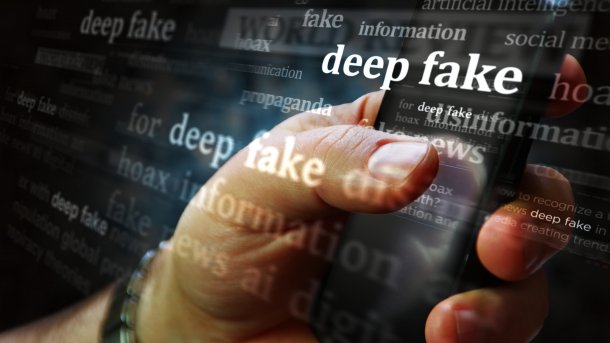Up to 5 years in prison: Federal Council to make deepfakes punishable
The federal states have endorsed a bill calling for severe penalties for the "violation of personal rights through digital forgery".

(Image: Skorzewiak/shutterstock.com)
The Federal Council is calling for tougher action against deepfakes. To this end, it has proposed a bill to protect personal rights under criminal law through such realistic-looking media content that is generated on computers ... increasingly often using artificial intelligence (AI). The state chamber is thus following an initiative by Bavaria. The core of the draft is a new section 201b of the German Criminal Code (StGB). According to this, anyone who disseminates a computer-generated or altered recording that appears to be realistic due to its "external appearance, behavior or verbal statements" and thereby violates the personal rights of another person is to be punished with a fine or imprisonment of up to two years. This should also apply to references to deceased persons.
Anyone who makes such media content accessible to the public or disseminates deepfakes that concern "an act of highly personal life" could even face five years in prison or a fine, according to the plan. Actions "carried out in the exercise of overriding legitimate interests" are to be exempt. The Federal Council refers, for example, to art or science, research and teaching as well as reporting on current events. Image and sound carriers or other technical means "used by the perpetrator or participant" could also be confiscated.
The federal states justify their motion by stating that deepfakes pose "considerable risks to individual personal rights and assets, as well as to the democratic decision-making process". Particularly due to the ever-improving products of AI, these represent a "particularly dangerous form of information manipulation for the state and its citizens". Deepfakes are also increasingly being used by criminals to achieve abusive goals such as disinformation or unlawful enrichment.
Videos by heise
Concerns about deepnudes and shock calls
Above all, deepfakes also create dangers for the protection of privacy, the Federal Council explains. Women and girls are often "placed in a sexual context that did not previously exist and was obviously not wanted by those affected" ("deep nudes") through the technical manipulation of image or video recordings. The perpetrators often aim to "make these people the object of their own sexual interests or to live out their need for revenge and power on them". For those affected, the harmful effects hardly differ from those of the unwanted dissemination of real nude photos. Deepfakes are also used, for example, to "discredit other people as effectively as possible in the political opinion contest" or to make "shock calls" with supposed voices of close relatives. Chancellor Olaf Scholz (SPD), for example, has already had experience with an AI-animated video of himself.
The Committee for Women and Youth had spoken out in favor of clarifications. It also wanted the production of deepfakes to be made a criminal offense. However, there was no majority for this in the plenary session. In a resolution, however, the Federal Council asked the federal government to initiate programs to identify and label manipulated content. It proposes setting up a central contact point to support small and medium-sized companies in matters of deepfake detection and labeling. The state chamber will now submit the bill to the Bundestag, which will then decide on it. There is no deadline for this. The federal government can comment beforehand. In March, a government spokesperson stated that instruments in the fight against AI-generated videos were "not actually sufficient" and saw a need for action.
(mki)